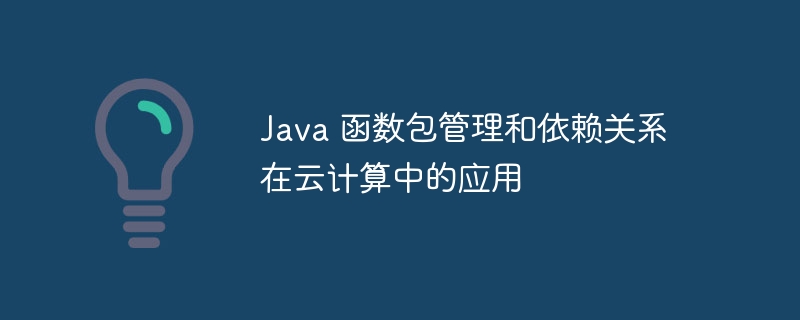
Java function package management and dependencies are crucial in cloud computing to ensure that functions run smoothly. Use Maven to manage dependencies. Configure Maven to resolve remote warehouse dependencies during local testing. The steps to deploy functions with dependencies vary depending on the cloud provider. The following shows sample code for deploying functions using Maven dependencies in Cloud Functions. It uses Google Cloud Logging to send log messages, and the code demonstrates the benefits of using dependencies when developing locally and running Java functions in the cloud.

In the cloud computing environment, the function package (Faas) platform is becoming more and more popular Welcome, which allows developers to write scalable serverless code. Java package management and dependencies are critical to ensuring your functions run smoothly.
Maven is a popular Java build tool that can be used to manage dependencies and build projects. To use Maven to manage the dependencies of a function, add the following code in the pom.xml file:
<dependencies>
<!-- 引入必要的依赖关系 -->
<dependency>
<groupId>com.google.cloud</groupId>
<artifactId>google-cloud-functions-framework-api</artifactId>
<version>1.0.12</version>
</dependency>
<dependency>
<groupId>com.google.cloud</groupId>
<artifactId>google-cloud-functions-invoker</artifactId>
<version>0.7.0</version>
</dependency>
</dependencies>Before testing the function locally, you Maven needs to be configured so that it can resolve dependencies imported from remote repositories. To do this, run the following command in the command line:
mvn clean install -DskipTests
The steps required to deploy a function with dependencies vary by cloud provider and function package Varies by platform. The following is how to deploy a function with Maven dependencies in Cloud Functions:
// Gradle 构建文件中
functions {
all {
runtime = 'java11'
env = ['FUNCTIONS_SIGNATURE_TYPE': 'cloudevent']
}
}
dependencies {
implementation 'com.google.cloud:google-cloud-functions-framework-api:1.0.12'
implementation 'com.google.cloud:google-cloud-functions-invoker:0.7.0'
}The following code example demonstrates how to use dependencies to write a simple HTTP function in Cloud Functions. The function uses Google Cloud Logging to send log messages:
import com.google.cloud.functions.HttpFunction;
import com.google.cloud.functions.HttpRequest;
import com.google.cloud.functions.HttpResponse;
import com.google.cloud.logging.LogEntry;
import com.google.cloud.logging.Logging;
import com.google.cloud.logging.Payload.StringPayload;
import com.google.cloud.logging.Severity;
import com.google.gson.Gson;
import java.io.BufferedWriter;
import java.io.IOException;
import java.nio.charset.StandardCharsets;
import java.time.OffsetDateTime;
import java.util.logging.Logger;
public class LoggingFunction implements HttpFunction {
private static final Logger logger = Logger.getLogger(LoggingFunction.class.getName());
private final Logging logging = Logging.getLogging();
// HTTP POST 请求的句柄
@Override
public void service(HttpRequest request, HttpResponse response)
throws IOException {
// 从请求中提取日志记录数据
String requestBody = request.getReader().lines().collect(Collectors.joining());
NameValueFunctionLoggingEntryDTO requestData = new Gson().fromJson(requestBody, NameValueFunctionLoggingEntryDTO.class);
// 构建日志记录项
LogEntry entry = LogEntry.newBuilder(new StringPayload(requestData.getData()))
.setSeverity(Severity.INFO)
.setLogName("my-log")
.setResource(new LogEntry.Resource.Builder("gae_app").build())
.build();
// 发送日志记录项
logging.write(entry);
response.getWriter().write(StandardCharsets.UTF_8.name());
}
// 用于解析请求正文的 DTO
private static class NameValueFunctionLoggingEntryDTO {
String data;
}
}When developing local Java functions, adding dependencies and using Maven to build the project can simplify the development process and ensure that your function runs smoothly on the cloud platform.
The above is the detailed content of Application of Java function package management and dependency in cloud computing. For more information, please follow other related articles on the PHP Chinese website!
